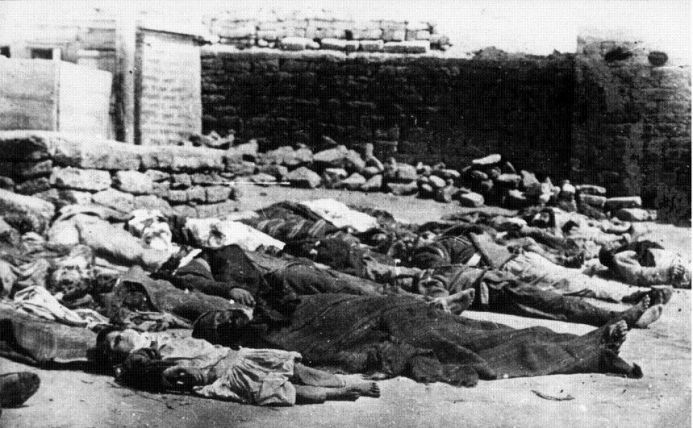March genocide not forgotten

By Laman Sadigova
Genocides have occurred in every corner of the globe, in ancient and modern societies, for reasons as diverse as the acquisition of land and resources, to the demented hatred of one single man for a particular group of people.
For a very long time now Azerbaijan's tragedy has stayed hidden from the world. But today it is time for the truth to be heard and for the truth to be known - March 1918 events will not remain locked away in a dark closet of history.
While Armenians continue to claim that they suffer a genocide from the hands of the Ottoman Empire, truth is, Armenians were the one who unleashed hell on the Caucasus.
In 1918, while the entire world was involved in World War I, the Armenian armed brigades, by using the prevailing anarchic situation in the region, attempted to exterminate the Azerbaijani nation. Armenian terrorists committed atrocities, to a degree of brutality and viciousness that words can begin to describe the horror of those days.
They executed about 15 thousand innocent people. Within a brief period of time, the Armenians committed massacres in Shamakhi, Guba, Irevan, Zengezur, Karabakh, Nakhchivan and Kars.
In March-April 1918 about 8,000 civilians were slaughtered in Shamakhi. Early in the morning Armenian gangs stormed the Muslim part of the city, setting houses on fire. They killed all well-known public figures and intellectuals. Those, who were trying to escape from the fire, were shot. The majority of all Muslim monuments of culture, including the Friday Mosque of Shamakhi, were set on fire and burnt to the ground with elderly, women and children still hiding in it. People were buried alive; some were brutally tortured before being killed.
The witnesses of the events stood horrified. Across Azerbaijan blood began to flow freely into the streets and bodies began to pile up … the trauma of those days remain.
According to the Emergency Committee of Inquiry, Armenians were inspired by a single idea - to kill and rob, rob and kill. According to eye witnesses, "a large number of corpses had been dropped in the wells and in the sea. The whole community was outraged by the atrocities of Dashnaks."
Those Russians or Georgians, who demanded an end to the massacre, were brutally executed.
Shamakhi’s 58 villages were wiped off the face of the earth, in Guba – 112, in Ganja – 272 (including 115 in Zangezur and 157 in Karabakh), in the Irevan province – 211 and 82 in Kars. They killed hundreds of thousands of Azerbaijanis; about a million people were driven from their historical-ethnic lands. This is just an incomplete list of settlements destroyed.
In particular, in the courtyard of Juma mosque Taza Pir in Baku Armenian bandits collected corpses and lit a bonfire with them.
The violence happened there was explained by Dashnaks’ desire to establish an Armenian state on Azerbaijan territory, by destroying the local ethnic population. Fortunately, the dedication of the people, and the subsequent formation of self-defense groups did not allow this to happen.
Anatoly Naumovicha Kvasnikov, a Jewish man, helped in establishing and corroborating events.
Kvasnikov wrote in his testimony, "The organized bloody conspiracy of Armenians against the Muslim population was aimed to physically destroy them first in Baku, then in the outskirts, capturing all their property and move all their natural wealth and political dominance in the hands of the Armenians."
Keen to reclaim its historical heritage and ensure facts will have precedent over lies, Azerbaijan has worked to rectify history books. Thanks to the Azerbaijani authorities, March events are now well known and confirmed.
After the proclamation of the Azerbaijani Democratic Republic on May 28, 1918, the “March events” were investigated by the new born government. In 1919-1920, the ADR observed March 31 as a national day of mourning. This was the first-ever genuine attempt to give a political and legal assessment of the policy of genocide against the Azerbaijani people. No other nation has commemorated the genocide as early as 1919 but the Azerbaijanis.
According to the decree published during the presidency of Heydar Aliyev, on 26 March 1998 31 March events have been officially recognized as Azerbaijanis Genocide Day. This ordinance is a vital step in restoring the historical reality of what happened.
Armenian terrorists’ violent and inhuman actions should never be forgotten and can never be justified. The world has to remember and keep the memory of the event of 1918.
Azerbaijan will never forget what crimes were committed against its people, and will continue to demand that justice be served and truth restored completely.
---
Follow Laman Sadigova on Twitter: @s_laman93
Follow us on Twitter @AzerNewsAz
Here we are to serve you with news right now. It does not cost much, but worth your attention.
Choose to support open, independent, quality journalism and subscribe on a monthly basis.
By subscribing to our online newspaper, you can have full digital access to all news, analysis, and much more.
You can also follow AzerNEWS on Twitter @AzerNewsAz or Facebook @AzerNewsNewspaper
Thank you!
